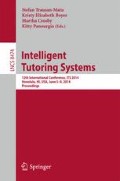Abstract
In this paper, the language independence of DOM-Sortze for creating Educational Ontologies from electronic textbooks is tested. DOM-Sortze has been designed to be language and domain independent. Initially, it was tested with documents written in the Basque language. In this work, DOM-Sortze has been enhanced to deal with the English language. In addition, the benefit of incorporating Wikipedia as a knowledge source in the elicitation process of the Educational Ontology is also considered. The obtained results confirm the language independence of this approach.
Access this chapter
Tax calculation will be finalised at checkout
Purchases are for personal use only
Preview
Unable to display preview. Download preview PDF.
References
Nkambou, R.: Modeling the Domain: An Introduction to the Expert Module. In: Nkambou, R., Bourdeau, J., Mizoguchi, R. (eds.) Advances in Intelligent Tutoring Systems. SCI, vol. 308, pp. 15–32. Springer, Heidelberg (2010)
Larrañaga, M., Conde, A., Calvo, I., Elorriaga, J.A., Arruarte, A.: Automatic Generation of the Domain Module from Electronic Textbooks: Method & Validation. IEEE Transactions on Knowledge and Data Engineering 26, 69–82 (2014)
Fok, A.W.P., Ip, H.H.S.: Educational Ontologies Construction for Personalized Learning on the Web. In: Jain, L.C., Tadman, R.A., Tadman, D.K. (eds.) Evolution of Teaching and Learning Paradigms in Intelligent Environment. SCI, vol. 62, pp. 47–82. Springer, Heidelberg (2007)
Pazienza, M.T., Stellato, A. (eds.): Semi-automatic ontology development: Processes and resources. Information Science Reference, Hershey (2012)
Buitelaar, P., Cimiano, P., Magnini, B. (eds.): Ontology Learning from Text: Methods, Applications and Evaluation. IOS Press (2005)
Fellbaum, C.: WordNet: An Electronic Lexical Database. MIT Press (1998)
Vossen, P.: Extending, Trimming and Fusing WordNet for Technical Documents. In: NAACL-2001 workshop on WordNet and Other Lexical Resources: Applications (2001)
Cimiano, P., Hotho, A., Staab, S.: Learning Concept Hierarchies from Text Corpora using Formal Concept Analysis. Journal of Artificial Intelligence Research 24, 305–339 (2005)
Hearst, M.A.: Automatic Acquisition of Hyponyms from Large Text Corpora. In: Procs. of the 14th International Conference on Computational Linguistics, pp. 539–545 (1992)
Buitelaar, P., Olejnik, D., Sintek, M.: A Protégé Plug-In for Ontology Extraction from Text Based on Linguistic Analysis. In: Bussler, C.J., Davies, J., Fensel, D., Studer, R. (eds.) ESWS 2004. LNCS, vol. 3053, pp. 31–44. Springer, Heidelberg (2004)
Verbert, K.: An Architecture and Framework for Flexible Reuse of Learning Object Components. Phd Thesis. Faculteit Ingenieurswetenschappen, Katholieke Universiteit Leuven (2008)
Larrañaga, M., Rueda, U., Elorriaga, J.A., Arruarte, A.: Acquisition of the Domain Structure from Document Indexes Using Heuristic Reasoning. In: Lester, J.C., Vicari, R.M., Paraguaçu, F. (eds.) ITS 2004. LNCS, vol. 3220, pp. 175–186. Springer, Heidelberg (2004)
Ratinov, L., Roth, D.: Design Challenges and Misconceptions in Named Entity Recognition. In: Proc. of the Thirteenth Conference on Computational Natural Language Learning. CoNLL 2009, pp. 147–155. Association for Computational Linguistics (2009)
Milne, D., Witten, I.H.: An open-source toolkit for mining Wikipedia. Artificial Intelligence 194, 222–239 (2013)
Ponzetto, S.P., Strube, M.: Deriving a large scale taxonomy from Wikipedia. In: Proceedings of the 22nd National Conference on Artificial intelligence, AAAI 2007, vol. 2, pp. 1440–1445. AAAI Press (2007)
Author information
Authors and Affiliations
Editor information
Editors and Affiliations
Rights and permissions
Copyright information
© 2014 Springer International Publishing Switzerland
About this paper
Cite this paper
Conde, A., Larrañaga, M., Arruarte, A., Elorriaga, J.A. (2014). Testing Language Independence in the Semiautomatic Construction of Educational Ontologies. In: Trausan-Matu, S., Boyer, K.E., Crosby, M., Panourgia, K. (eds) Intelligent Tutoring Systems. ITS 2014. Lecture Notes in Computer Science, vol 8474. Springer, Cham. https://doi.org/10.1007/978-3-319-07221-0_69
Download citation
DOI: https://doi.org/10.1007/978-3-319-07221-0_69
Publisher Name: Springer, Cham
Print ISBN: 978-3-319-07220-3
Online ISBN: 978-3-319-07221-0
eBook Packages: Computer ScienceComputer Science (R0)

